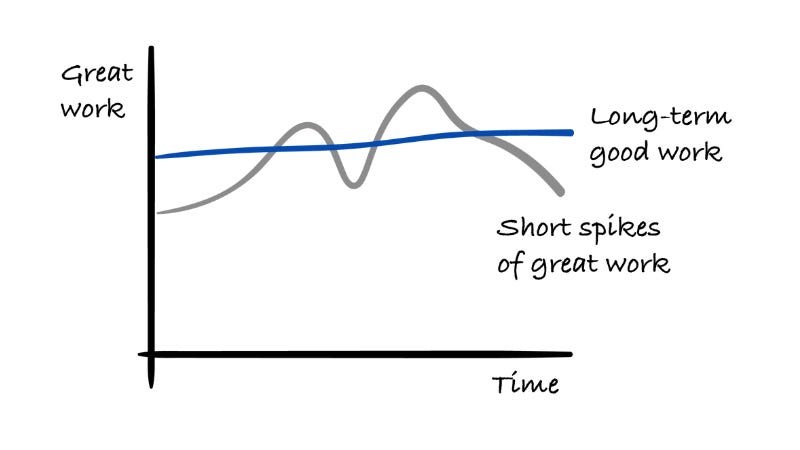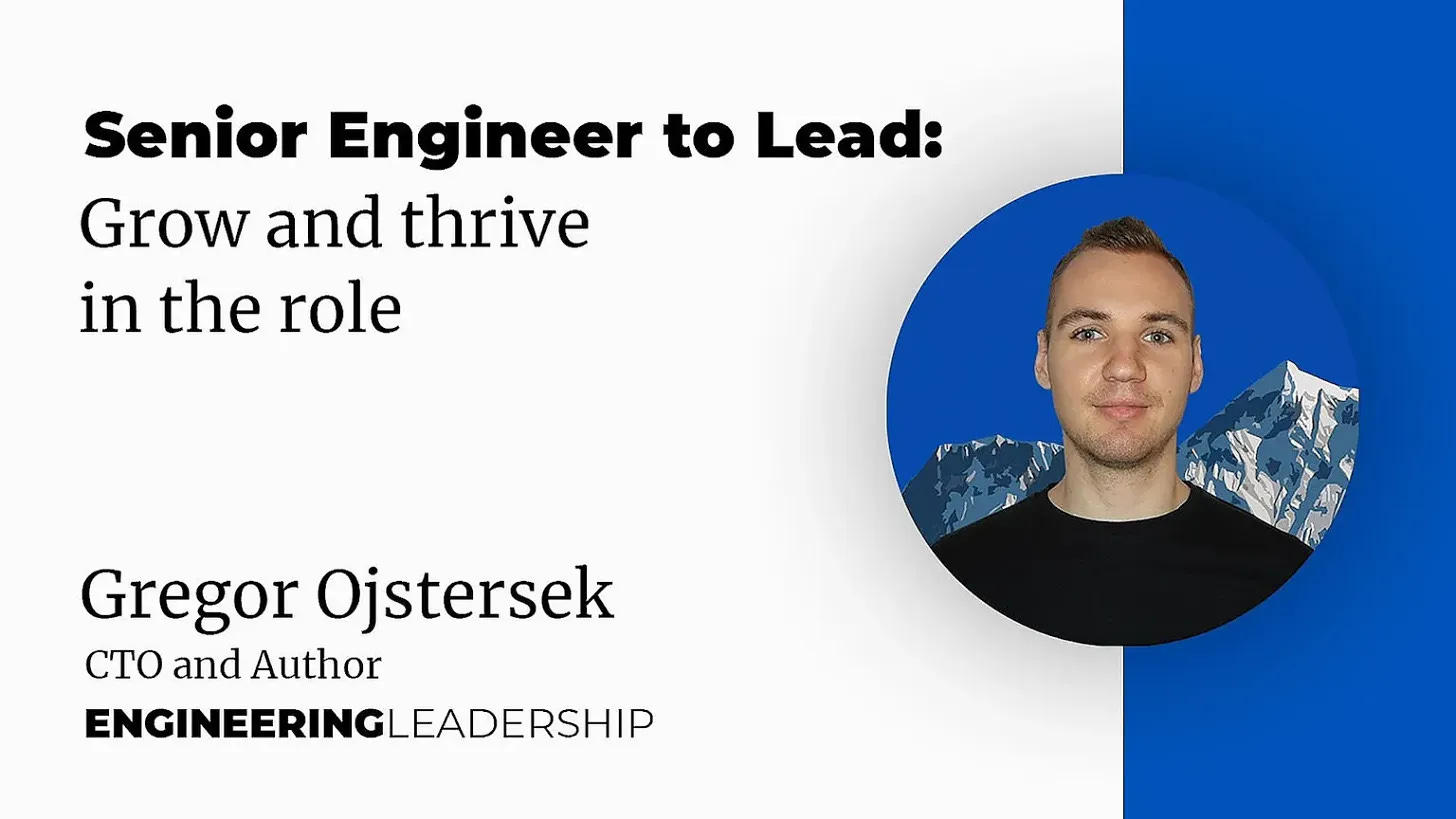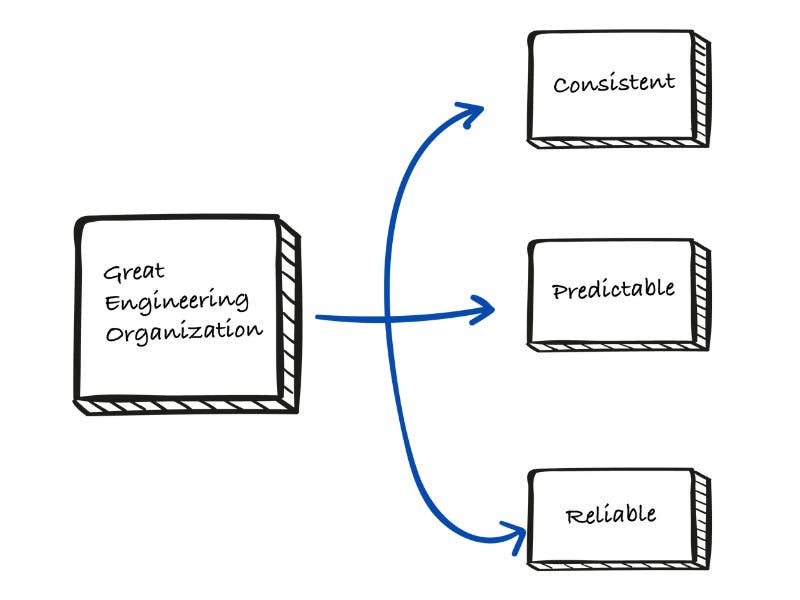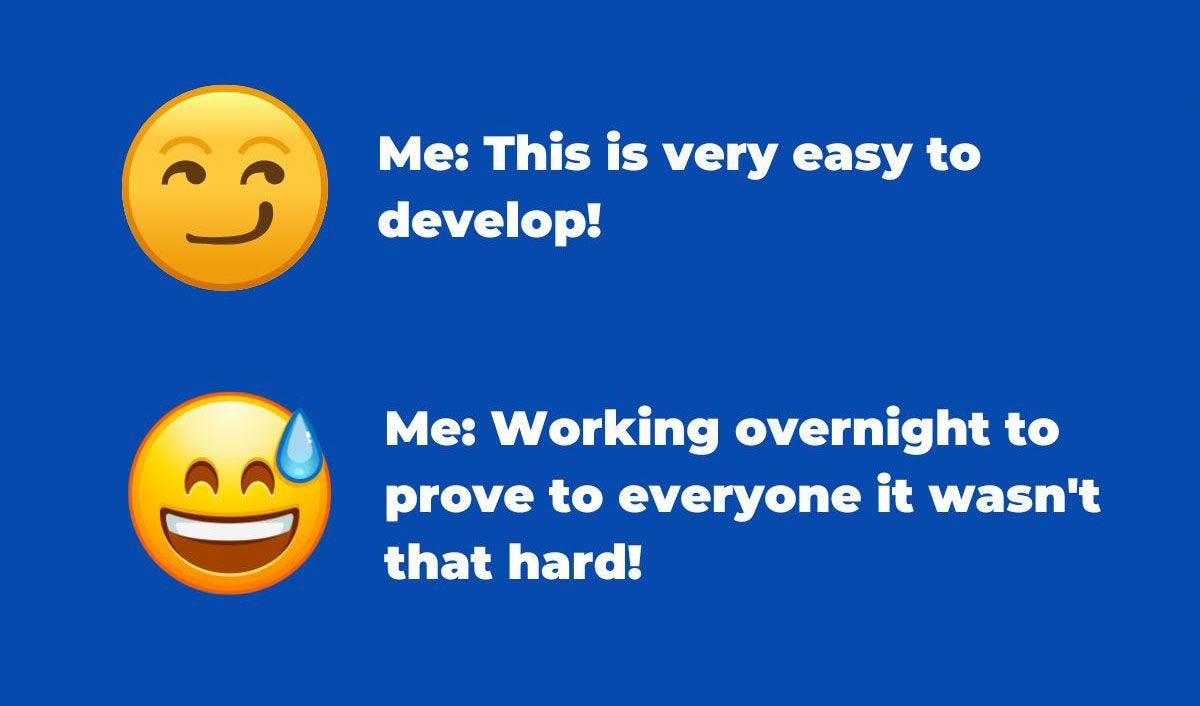I Am Not a Fan of Heroism in the Engineering Industry
I am not a fan of heroism in the engineering industry #
Excerpt #
📈 Long-term good work > 📉 short spikes of great work
[

Senior Engineer to Lead: Grow and thrive in the role (announcement) #
[

]( https://maven.com/gregor-ojstersek/senior-engineer-to-lead?promoCode=EARLYBIRD)
It’s getting close to the start of my new cohort course! It’s going to start on July 9. So excited for it!
In the course, we will particularly focus on the development of much needed people / communication and leadership skills in order to grow from engineer to leader!
In order to share my excitement with you, I have a special announcement:
If you are not enrolled yet, you can now enroll with 50% off via the page here: Special deals for paid subscribers.
For everyone else, you can still get the course with the early bird price of 25% off for the next 3 days only!
Use code EARLYBIRD for 25% off or use this link: Senior Engineer to Lead where the code is already applied.
Looking forward to seeing you there.
Let’s get back to this week’s thought.
Intro #
We all like to be viewed as high-performers or people that get things done. One of the ways that we believe to achieve this is by being the “hero” when the time comes to save the project or to release that feature in a timeframe that was put in place for the beginning.
Is this a good thing or is this a bad thing? Well, you can already see from the title of the article that this is not the behavior that I am a fan of and in this article, we will define it why!
But first, let’s break down what “heroism” actually is.
What exactly does “heroism” mean in the engineering industry? #
I’ve made many different mistakes in my career both as an engineer and engineering leader and one of them was that I wanted to be the “hero” who could solve all the issues instead of focusing on long-term success as a team.
This was especially prevalent when I grew from Senior Software Engineer to Team Lead. I wanted to be included in all of the details and have a say in everything in order to have complete control of the team and the project. I spent long hours every day and also weekends doing that.
This got me close to burning out and it made me re-think what I should actually be doing.
You can read my full story on how I grew from an engineer to the team lead position here: From IC to manager (paid article).
This describes what “heroism” in our industry means pretty well. It’s a state where we think that we need to do an extraordinary amount of work in a specific timeframe. That can be working on weekends or doing long hours every day.
The problem comes because it’s not sustainable and it can lead to burnout. Let’s get to that next.
Heroism can lead to burnout #
Newton’s 3rd law states this behavior really well:
For every action (force) in nature there is an equal and opposite reaction. If object A exerts a force on object B, object B also exerts an equal and opposite force on object A.
So, if we spend a whole weekend working on finishing the project during the crunch time, there will be an opposite reaction, where we will need to recharge in order to get back to the normal state.
Do this enough times and you may be close to burning out. The same is true with working long hours every day. Doing this enough times and you may be close to burning out.
Of course, every person is different, but the real competitive advantage comes from having a good work-life balance. A good work-life balance is what keeps us doing good work long-term!
Doing good work long-term is a HUGE competitive advantage #
“If you can get 1 percent better each day for one year, you’ll end up thirty-seven times better by the time you’re done. Conversely, if you get 1 percent worse each day for one year, you’ll decline nearly down to zero. What starts as a small win or a minor setback accumulates into something much more.”
— James Clear
Consistency will always prevail over short spikes of great work. Especially take a closer read to the second part. Short spikes of hard work can lead to burnout and that will actually cause the opposite effect.
I believe that in our great engineering industry if you are not growing, you are stagnating and ultimately, because things are changing and moving so fast, you are actually getting worse if you are not learning new things.
So, definitely invest in developing good habits and find a way to stay consistent for longer periods of time. That’s where really good things happen!
If you haven’t read these 3 books yet, I highly recommend them:
Atomic Habits: An Easy & Proven Way to Build Good Habits & Break Bad Ones by James Clear
Eat That Frog!: 21 Great Ways to Stop Procrastinating and Get More Done in Less Time by Bryan Tracy
Getting Things Done: The Art of Stress-Free Productivity by David Allen
As a manager, I value long-term good work instead of short spikes of great work #
As a manager, whenever I look at the performance of a certain engineer, I always look at:
consistency,
predictability,
reliability.
The reason is that I rather know exactly what I can expect, than hope to get good work unexpectedly. I want to avoid variability as much as possible when organizing work or considering any timelines for projects.
[

And being a true professional means exactly that.
Sporadic behavior will just lead to the loss of credibility. Don’t forget that credibility is a two-part thing. Your skills and how people perceive you. The second part is closely affected by how reliable, consistent and predictable you are.
You can read more about credibility and how to build it here: How to build credibility in the engineering industry (paid article).
All 3 mentioned traits are also extremely important for the engineering organization in order for the business to be successful in the end. A consistent, reliable and predictable engineering organization is a HUGE asset for the business.
I’ve tried to be viewed as a “hero” who can solve things very quickly and spent the whole night trying to prove it #
I’ll tell you one of the bad habits that I used to do, especially at the start of my career.
Me on the planning: This is very easy to develop!
Me: Working overnight to prove to everyone it wasn’t that hard!
[

After many failures, I learned that it’s not the end of the world if something takes more time than it’s actually estimated. As long as there are valid reasons for it and the overall project is still on track.
Some tasks may take longer, some tasks may take less time than estimated. You get better at it, but you’ll never be perfect.
Trying to be the “hero” may give you some short-term satisfaction, but you may become a big liability to the team because it’s not something you can sustain for longer periods of time.
What others are saying? #
There were some really great comments yesterday’s LinkedIn post that I published.
I am happy to share some of them with you.
You can’t schedule flashes of brilliance or bursts of productivity.
When I’m interviewing, it’s one of my red flags. “Can you tell me about the last time there was a crisis, and you had to work through the weekend? What was the outcome, and how did the company react?”
If they talk about how the people who worked over the weekend were heroes, that’s a clear concern.
If they talked about the incident report, the great lessons learned, and the measures put into place to prevent it happening again, I’m much happier.
— Ken Corey, Author and Senior Engineering Manager
Engineering consistency enables business boldness. — Steven Syrek, Engineering Manager @ DeepL
Consistency is the biggest for me. I have had lots of people who over communicate and are always available in the beginning. And then they slowly stop being as vocal. — Eric Roby, Senior Software Engineer @ WillowTree
I do appreciate engineers who rise to the occasion, but if this becomes by design it’s certainly problematic.
— Omar Halabieh, Tech Director @ Amazon Payment Services
Predictability is important. When you are responsible for delivery day in and day out, you are looking for predictability and reliability.
— Biana Babinsky, Manager, Technical Program Management @ DocuSign
And a fun one for the end! This one got me laughing :)
CPR(Consistency, Predictability and Reliability) is the key!!! So that we don’t have to do CPR(medically) to the business to revive later😀😀🤭
— Sai Kalyan Kandur, Lead Data Engineer @ Walmart
Last words #
Thanks for all of the great insights from the LinkedIn community about this important topic. Keep an eye on Saturday’s preview post of the newsletter and provide a great comment and you’ll have a chance to be featured in the article!
Let’s end this article with the following:
If there is one thing you should take from this article that is to focus on consistency. It is literally a cheat code to success. Being consistent has done SO much for me in terms of my career and this newsletter as well. I wouldn’t be where I am without it.
Liked this article? Make sure to 💙 click the like button.
Feedback or addition? Make sure to 💬 comment.
Know someone that would find this helpful? Make sure to 🔁 share this post.
Whenever you are ready, here is how I can help you further #
Book a Coaching and Mentoring or Consulting and Advising call with me here.
Interested in sponsoring this newsletter? Check the sponsorship options here.
Get in touch #
You can find me on LinkedIn or Twitter.
If you wish to make a request on particular topic you would like to read, you can send me an email to info@gregorojstersek.com.
This newsletter is funded by paid subscriptions from readers like yourself.
If you aren’t already, consider becoming a paid subscriber to receive the full experience!
Check the benefits of the paid plan
You are more than welcome to find whatever interests you here and try it out in your particular case. Let me know how it went! Topics are normally about all things engineering related, leadership, management, developing scalable products, building teams etc.